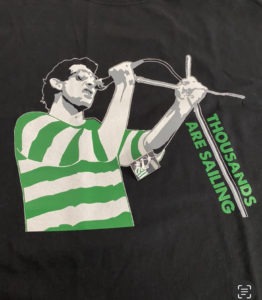Unfortunately, Martin O’Neill never played football for Celtic. Teams like Nottingham Forest and their perpetually controversial manager Brian Clough enjoyed that privilege, and, like Celtic themselves, he had won the European Cup. When he came to Celtic in 2000, he had already established himself as manager of Leicester City, winning two English League Cups and losing another final, so it would be fair to describe him as a “winner”.

https://celticfanzine.com/product-category/new-issue/
But Celtic on June 1 2000 were still, to a large extent, losers. This was the fourth summer in a row that they had had to appoint a new manager – Jansen n 1997 turned out to be good but found life at Parkhead difficult, Venglos was old and unlucky, Barnes was just awful and when O’Neill came along, we simply did not know where we were. It was all very confusing, but oh! how we needed a boost!
O’Neill had that intense, concentrated, academic look about him. There was a certain steely determination. He had grown up in Ireland supporting Celtic in Scotland (and Sunderland in England) and made it clear that there was no limit to his ambition for the club. Fortunately at this time in history the Board were ambitious as well and were prepared to release some money, notably for Chris Sutton, an acerbic character who had shown plenty of potential with Blackburn Rovers and Chelsea, but had as yet to find consistency. Other buys followed, but Sutton was O’Neill’s master stroke.
One would need superhuman intelligence to answer the question of what makes a good manager – but one can point out four criteria, namely good judgement in the transfer market, good man-management skills to bring out the best in players, the backing of the Board and a certain amount of good luck. O’Neill, at least in his first season had all four. Occasionally his judgement let him down in future years, but even then, he was more good than bad, and never did the supporters turn against him, something that is always possible with the fickle wearers of the green and white scarves.
The first game in 2000/01 was won at Dundee United, but the public proclamation of the new Celtic came at Parkhead in late August in what became known as “the demolition derby” made famous by the supporters mocking the Rangers sectarian song “and the cry was no defenders”. Celtic won 6-2 and it set the tone for the season. Rangers never recovered, and Celtic won the treble in 2001, winning the League with games to spare and the two Cups with impressive performances in the finals against Kilmarnock and Hibs.
O’Neill was fortunate in that he had Henrik Larsson on song, but there were other great players as well – Neil Lennon, Johan Mjallby, Paul Lambert, Stilian Petrov, but perhaps the game that showed the real depth of that new O’Neill side was the League Cup final against Kilmarnock when injuries, suspensions and player being cup-tied compelled O’Neill to play youngsters like Colin Healy, Jamie Smith and Stephen Crainey, and Celtic still won 3-0, even after Sutton had been sent off! Mind you, with a player like Henrik Larsson, you can afford to give the opposition a chance, and still win!
Seldom have Celtic supporters taken to a manager so quickly, and very soon songs were composed in his honour. Next season failed to repeat the treble, for Rangers got the better of him in both Cups (narrowly) but the standard of football was possibly better with some really devastating performances to win the League. The Scottish Cup final was, as we have said, narrow with Rangers scoring the winner in injury time, but Celtic fans felt that perhaps had O’Neill deployed Moravcik, it might have been a different story. It was possibly his first blemish.

https://celticfanzine.com/product/thousands-are-sailing-t-shirt-badge-set-copy/
O’Neill made no secret that he wanted to perform on the European stage, and 2003 was his year. Beating teams like Celta Vigo, Stuttgart and particularly Blackburn Rovers and Liverpool on the way, Celtic reached a European final for the first time since 1970. The end result was disappointment, but it was a great experience for the Celtic fans who did themselves and their country proud. A bigger disappointment was the fact that this success was achieved at the cost of Rangers winning a domestic treble with Celtic and O’Neill possibly guilty of taking their eye off the ball at key moments, never more so than in underestimating Inverness Caledonian Thistle in the Scottish Cup quarter final when O’Neill’s team selection baffled supporters and journalists alike.
He learned from that, though, bouncing back in 2004 with a League and Cup double as well as a tolerable run of success in Europe. Once again, the League was won with games to spare, and the Scottish Cup in a final when, with the team 0-1 down at half time to a spirited Dunfermline side, things did not look too rosy, until Henrik Larsson got going.
It was a shame that the O’Neill quinquennium finished on a low note in 2005. His wife was ill (happily she recovered) and this may have affected O’Neill’s judgement. The tragic events of Black Sunday are well known, and O’Neill cannot really be blamed for that one game. Where perhaps one can question his judgement was in the leading up to that game when the team went stale and manged to lose at home to both Hearts and Hibs (a rare combination for both Edinburgh teams to win at Parkhead!) and little was done to freshen up the side, when he had a few talented youngsters available to give a breather to obviously tired players like John Hartson. The League lost, and Martin having announced that he was leaving on compassionate grounds, he nevertheless gave us something to smile about when he won the Scottish Cup on a rainy day against Dundee United at Hampden.
O’Neill remains a difficult, complex sort of character. If Maley and Stein both had Golden Ages in Celtic’s history, O’Neill would qualify for a Silver Age Award. He picked Celtic up from where they were in 2000 (basically rudderless and looking good for a return to the horrors of 1993) to being a European force once again. It is a shame that this European dimension has not been sustained. Perhaps if Martin had stayed around, it might have been.
Celtic seems also to have been the apogee of his career. His career subsequently has been disappointing with Aston Villa, Sunderland (both of these teams traditional graveyards for managers, and Martin proved no exception) and the Republic of Ireland, where heas was a tolerable but not a total success.

https://celticfanzine.com/product-category/celtic-collectors-badges/
Born in 1948, David Potter first saw Celtic at Dens Park, Dundee in March 29. It was a 3-5 defeat, which equipped him admirably for the horrors of the early 1960’s. He had “followed” Celtic for a few years before that and recalls having been called upon to impersonate Jock Stein and receive the family silver teapot which had to do for the Scottish Cup as it was presented on April 24 1954, after he and his father had spent a nerve wracking afternoon listening to the radio! Since then, he has “followed” every Celtic game with bated breath, and has written extensively about the club in magazines and books. His favorite team was that of 1969 (which he rates marginally better than 1967) and his favorite player was Henrik Larsson.
His ambition for Celtic is for them to keep on winning silver in Scotland and to be something in Europe once again. His other interests are cricket and drama. He is 70, a retired teacher of Classical Languages, married with three children and five grandchildren. He now travels on the Joseph Rafferty bus from Kirkcaldy. He also loves Forfar Athletic.

https://celticfanzine.com/product-category/t-shirts/

https://celticfanzine.com/celtic-supporters-festival-thailand-2023/
Copyright 2018 Celtic Fanzine | Developed by Blueberry Design